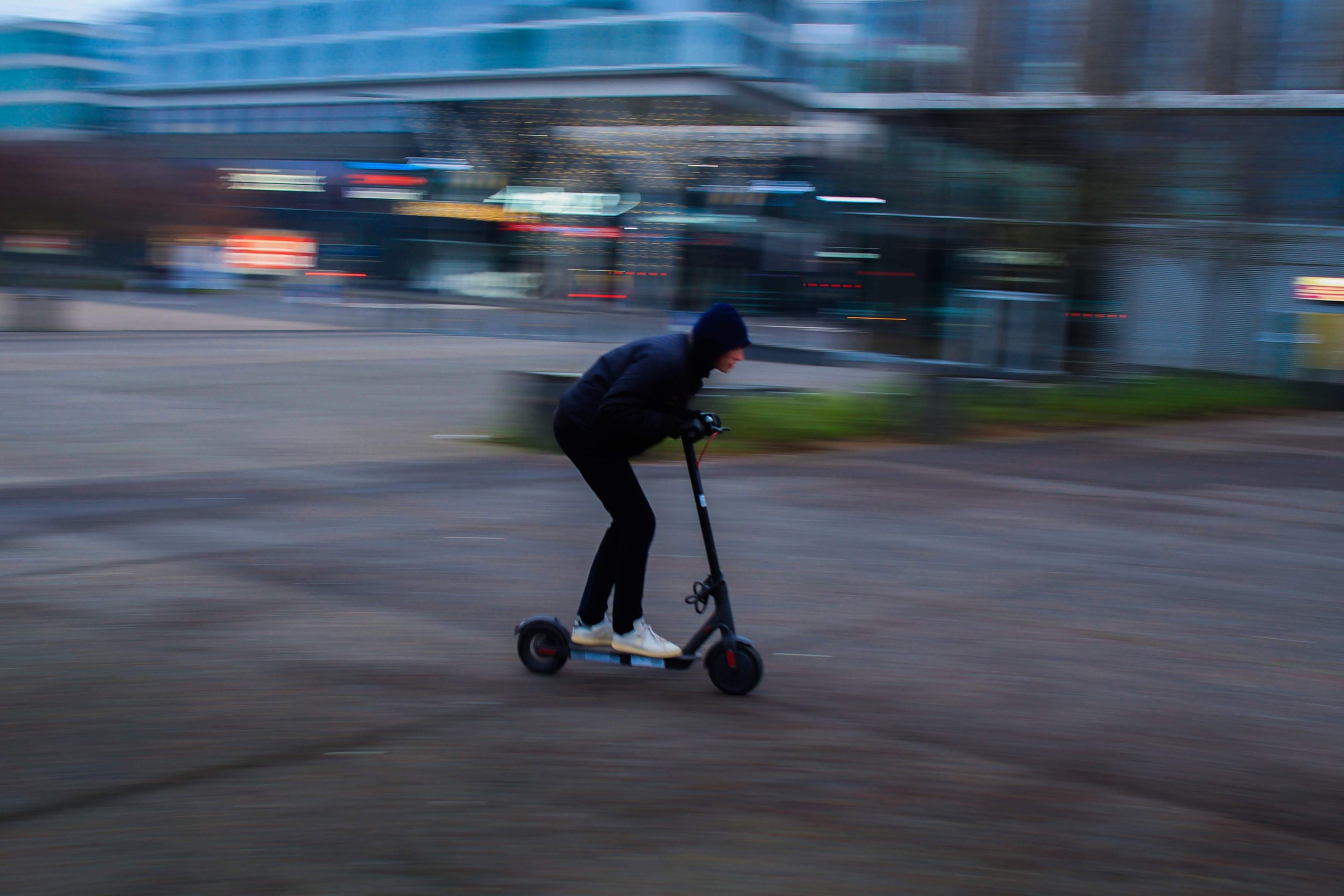In parallel with the launch of public, regulated trials of e-scooters across England, private, and currently illegal, e-scooter use on our roads and in other public spaces has increased. The unsafe nature of some private e-scooters, and irresponsible use by some, is leading to serious casualties and risks harming efforts by rental operators and local authorities seeking to provide a safe, low-carbon mobility option.
While the government-approved e-scooter rental trials are intended to assess safety, there is little measure of the impact of the safety of private e-scooter on riders and other road users. PACTS has carried out research, funded by The Road Safety Trust, to understand more about their safety and the number of casualties injured in collisions involving e-scooters.
Casualty data – fatalities
Since 2019, PACTS is aware of a total of thirty-seven deaths involving e-scooters, one in 2019, three in 2020, thirteen in 2021, fourteen in 2022 and six in 2023 (to end October). A register is available here (latest edition 4 April 2024). The youngest person who has died was a 12-year-old rider, the oldest rider was 74. Trial rental e-scooters have been involved in four incidents where someone has died, one relating to a 75-year-old moving a parked rental e-scooter. Sixteen riders have died in single-vehicle collisions and one pedestrian has died having been struck by someone who was riding an e-scooter.
Following the death of a 14 year old in March 2022 a prevention of future deaths report has been published by the coroner for the case. Matters of concern which have been raised include:
1. An inverse correlation exists between the rate of legal enforcement and the rate of deaths caused by e-scooters.
2. Riders of legally authorised scooters (those hired from licenced operators) are not required to wear head protection .
3. The lack of written warnings about the illegal use of e-scooters, and concern that where such warnings are present, often they are not prominent.
Responses from the Department for Transport, Transport for London, the Metropolitan Police Service and a number of e-scooter retailers have been published. From 5 December 2023 a new driving licence verification procedure starts for all new and existing active participants of the e-scooter trials.
In 2020 PACTS was awarded a grant by the Road Safety Trust to collect data relating to incidents involving these micro-mobility devices and to form recommendations for their construction and use. Working with partners from a broad spectrum of backgrounds and fields of expertise PACTS has:
- gathered data of casualties involving e-scooters (riders and other road users) collected from the media, police forces and insurance firms;
- published a report summarising our findings and recommendations for regulation of private e-scooters – construction and use; and
- hosted a webinar on Thursday 24th March with eleven panellists and over 100 delegates.
If the Government decides to legalise use of private e-scooters, PACTS recommends it should adopt regulations for their construction and use as set out below:
• Maximum possible speed of 12.5mph (20km/h)
• Maximum continuous rated motor power of 250 W
• Anti-tampering mechanisms should be included in construction. Tampering should be prohibited
by law
• Minimum front wheel size of 12 inches (30.5cm) and minimum rear wheel size of 10 inches
(25.5cm)
• Two independently controlled braking devices, one acting on the front wheel and one acting on
the rear wheel
• Lighting to be mandatory at all times
• Maximum unladen weight of 20kg
• An audible warning device to be mandatory
• Helmet wearing to be mandatory
• Riding on the footway (pavement) or footpath to be prohibited
• Rider age limit of at least 16 years
• Carrying of a passenger to be prohibited
• Drink driving, dangerous or careless riding, and handheld mobile phone use to be prohibited
• In-person rider training and third party insurance are recommended
Under recording of e-scooter casualties
In October 2022 PACTS was awarded additional funding to from The Road Safety Trust to investigate the extent of under-reporting of e-scooter casualties and ways in which this could be improved. By analysing data from two months in late 2021 PACTS looked at 300 casualties recorded by hospitals across the UK, police records and data from the rental trials to identify matches between the different datasets. Findings were published in a report in January 2024 and showed that fewer than 10% of casualties with any level of injury from a collision involving an e-scooter presenting to emergency departments were recorded in the official data.
e-scooters, be they in the regulated rental trials or privately owned, are classed as motor vehicles. Collisions resulting in injury should be reported to the police. Capturing data from collisions with illegally ridden private e-scooters may be difficult. That should not be the case for the 23,000 rental e-scooters in the Government run trials.
PACTS calls on the DfT to:
- Improve the means of recording e-scooter casualties using the rental e-scooter schemes by updating guidance to operators and local authorities so data collection more closely aligns with recording systems the police use; and,
- Increase the opportunities for casualty data to be collected by issuing clear information to the public about the obligations of reporting road traffic collisions to the police, including those involving e-scooters on public roads and public places.
e-scooter rental trials
It is clear that the rental trials have been an opportunity to carry out a detailed study of e-scooter use. Having started with 37 scooters in July 2020 23,000 were available in December 2021. Over 18 months, across 32 trial areas in England 14.5 million rides were made by 1.4 million users.
The Department for Transport’s (DfT) evaluation report of the e-scooter trial rental schemes was released in December 2022. It includes qualitative and quantitative data from users of the schemes, residents in trial areas and police data for the first eighteen months of the trials. PACTS has raised questions relating to safety as more could be learnt.
PACTS is concerned that unless more rigorous data collection is introduced that opportunity will be missed. A letter to was sent in March 2023 to the relevant Minister with comments. In December the same year another letter was sent, as trials were extended yet another time, until May 2026. PACTS met with the Minister in early 2024 and understands that another evaluation is anticipated to start later in 2024. With the appropriate data being collected there is the potential to make well-informed decisions on future legislation.
Related content
Joint report with European Transport Safety Council – Recommendations on Safety of E-scooters – ETSC and PACTS
Interim report – ‘The safety of private e-scooters’ Interim report from PACTS
Letter to the Minister with PACTS recommendations – Recommendations for the construction and use of private e-scooters
Letter from the Minister to PACTS in response to recommendations – Minister welcomes PACTS contribution to the evidence on e-scooter use
PACTS oral evidence to the Transport Committee on e-scooters – PACTS submits oral evidence to Transport Select Committee on E-scooters: Follow-up Inquiry – PACTS
Letter to the Minister with PACTS comments on the e-scooter rental trials evaluation report – What have we learnt from the e-scooter trials? – PACTS
Letter from the Minister to PACTS in response to comments on the e-scooter rental trials evaluation report – Minister confirms consultation about e-scooter regulations will be held


